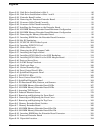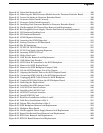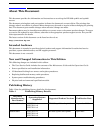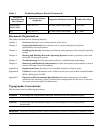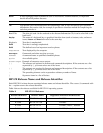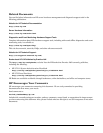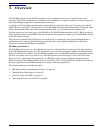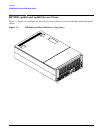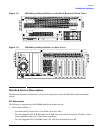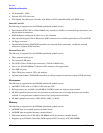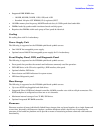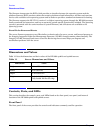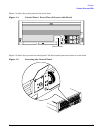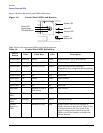
Chapter 1
19
1 Overview
The HP 9000 rp4410 and the HP 9000 rp4440 servers are designed to be easy to install, service, and
maintain. They deliver performance, reliability, and availability in a compact, rack-dense design to meet the
most demanding enterprise-level computing requirements.
A rack-dense 4U form-factor maximizes the number of servers for each rack, up to 10 systems for each HP
10000 G2 series rack (42U). They fit easily into the HP 10000 G2 series rack and into many third-party racks
using side-mounted slides and a cable management arm that you can install quickly without tools.
You can equip the servers with up to eight 800 MHz or 1.0 GHz PA-8900 processors with 1.5 MB of on-chip L1
cache for each processor and 64 MB of shared L2 cache for each processor module, up to 128 GB RAM, and six
PCI-X I/O expansion slots.
The blue server identification LED can be activated locally or remotely for easy physical identification of
problem hardware, and the QuickFind diagnostic LED panel speeds problem diagnosis by identifying
defective or mismatched hardware components.
HP 9000 rp4410 Server
The HP 9000 rp4410 server is a PA-8900-based server in a 4U form factor. It is based on the same hardware
as the HP 9000 rp4440 server, but in the rp4410 server, two of the four processor sockets are disabled using
firmware, limiting it to a 2P/2C. Like the HP 9000 rp4440 server, the HP 9000 rp4410 server has full access to
all 16 or 32 memory slots (for a total of up to 128 GB of memory) and full access to all six PCI-X I/O slots.
Because it has a maximum of four processors, the HP 9000 rp4410 server qualifies for Oracle Standard
Edition licensing. The HP 9000 rp4410 server is available in 1P/1C, 1P/2C, and 2P/2C configurations and can
be easily upgraded to an HP 9000 rp4440 server using a firmware upgrade kit.
This chapter addresses the following topics:
• “HP 9000 rp4410 and rp4440 Server Views” on page 20
• “Detailed Server Description” on page 21
• “Controls, Ports, and LEDs” on page 24
• “Powering the Server On and Off” on page 42




